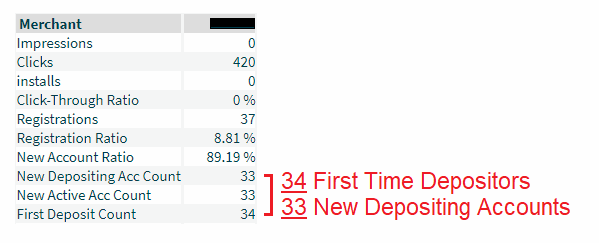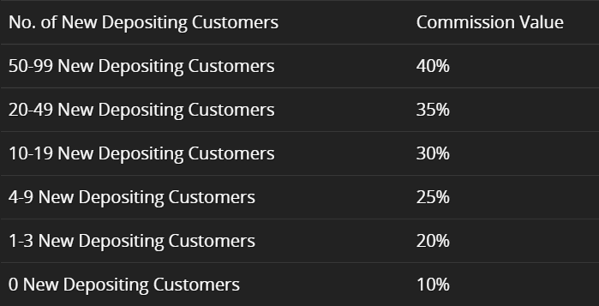For those of us in the iGaming industry it’s a safe bet that most people use the terms First Time Depositors (FTDs) and New Depositing Customers (NDCs) interchangeably to mean someone that signs up and then goes on to make a real money deposit, but that technically isn’t the case. Not for Income Access powered programs at least.
If you take a closer look at your stats you’ll notice that various IA reports include both FTDs and NDCs, and the numbers often aren’t the same – meaning that in IA FTDs are not the same as NDCs.

* The screenshot above is taken from the quick summary report if you want to check for yourself.
So what exactly is the difference? Turns out it’s simply a question of timing:
- New Depositing Account (NDC) – To qualify as a New Depositing Account the player must register and deposit in the same calendar month. So if they sign up on the 31st of January and depositing on the 1st of February they won’t be counted in January’s NDC stats.
- First Time Depositor (FTD) – A First Time Depositor is an account that has deposited for the first time, regardless of when they signed up. So in this scenario the player that deposits on the 1st Feb would be included in February’s FTD stats.
The calculations are based on calendar months, so a player signing up at 23:59 in Month 1 and deposited two minutes later at 00:01 in Month 2 would not count as a NDC.
| Date Registered | First Deposited | NDC | FTD |
|---|---|---|---|
| 1st January | 31st January | Yes | Yes (January) |
| 1st January | 1st February | No | Yes (February) |
We can easily confirm this by checking the account level report in Income Access. For the screenshot provided above we did indeed have 34 FTDs of which 33 of them had signed up in the same month (the 34th, it turns out, was from 2014).
This is also supported by Energy Partners’ terms and conditions which state:
Please note that First Time Depositing Customers (FTD) and the New Depositing Customers (NDC) are not equivalent. In case of NDC’s the registration month and the first deposit transaction month should be the same, while in case of FTD’s the registration date is not considered.
Why Does This Matter?
You may be thinking “so what” – it’s just a reporting quirk and it doesn’t affect the numbers of players you have in your accounts… but it does make a difference when it comes to negotiating deals and meeting activity quotas.
If a deal, tier or quota is based on NDCs instead of FTDs you could be selling yourself short as you’re using the lower of the two numbers. And whilst they are usually around the same, you’ll often see the number of NDCs as one or two lower than the number of FTDs.
Using Energy Partners terms again you’ll notice that their default commission structure is based on New Depositing Customers and not FTDs:

Using an extreme example, let’s say you referred two players over the first three months of a year – one in January and one in February and none in March. Both players registered but deposit the following month, so Mr January deposits in February and Mrs February deposits in March.
Assuming you didn’t refer any other customers in those months your NDC numbers for January, February and March would be zero, meaning you’d get stuck on the bottom 10% rate. Whereas if the deal was based on FTDs you would have zero in January, but one each in February and March – enough to send you into the next tier.